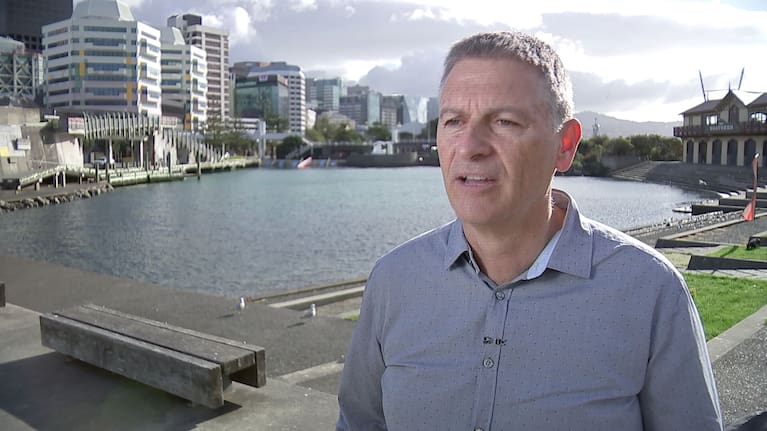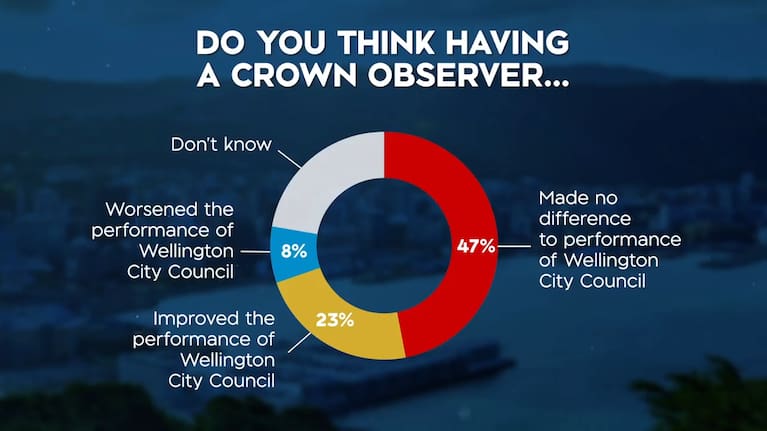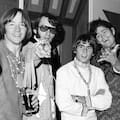Andrew Little holds a commanding lead in the Wellington mayoral race, a new Q+A Verian poll suggests.
The Labour candidate holds 58% of first preference votes among those surveyed who expressed a preference, according to the poll carried out between September 4 and 6.
Councillor Ray Chung trailed behind at 16%, businessman Karl Tiefenbacher was on 10% and councillor Diane Calvert was on 6% with five other candidates also making an appearance. The release of the results came shortly before Q+A's candidate debate.
Of all of those polled, including those who didn't express a candidate preference, 22% said they hadn't decided, and 20% were unlikely to vote or refused to say.
Q+A poll: Which Wellington mayoral candidate's pulling ahead of the pack - Watch on TVNZ+
Others in the 12-contender field for Wellington's mayor also appeared in the new poll.
Candidates to have polled above 1% in first preference votes include Rob Goulden 4%, Alex Baker 3%, Josh Harford 3%, Scott Caldwell 1%, and William Pennywize 1%.
Candidates clash over rates promises and housing
It comes as a new poll reveals the frontrunners in the race. (Source: Q and A)
Speaking on Q+A's mayoral debate, both Chung and Tiefenbacher opposed continuing Mayor Tory Whanau's signature $116 million project to upgrade the capital's Golden Mile, which was half-funded by NZTA and central government.
Little said he thought the objectives for the upgrade — to improve the street for pedestrians, cyclists and bus users — were "really important" but that it "needs to be reviewed for feasibility", like "all the projects that are in the long-term plan".
On rates, the three candidates appearing held three different views.

Chung maintained a stance on freezing rates for three years, which he claims could be funded through slashing council spending and finding "efficiencies" — amounts his rival Little dubbed would net "chicken feed" — while Tiefenbacher advocated for a hard cap.
Tiefenbacher refused to specify an exact maximum figure, saying rates needed to be "as low as they possibly can," but said he didn't know "if that's inflation, [or] if it's zero".
Little said he did not want a hard cap on annual rises but promised "a drastic reduction on the level of increase". He also argued that more affordable housing would attract more residents and therefore spread council costs across more ratepayers.

The candidates were also split on housing policy, with Little supporting more development near the city centre in a bid to lower the cost of new homes.
"If I've got to choose between protecting a character area and having a space available for more affordable housing, my priority is going to be more affordable," he said.
But Chung opposed reducing character protections, suggesting "council is actually very limited in what it can actually do to actually create affordable housing".
Tiefenbacher said population growth in the capital was low and "if we don't keep the rates down, we're going to lose more and more people". Both he and Chung also suggested there was already enough land around the city to stem a housing shortage.

Other poll questions reveal capital's views
Little's emergence as the frontrunner in the election comes after incumbent mayor Tory Whanau pulled out in April. But the former MP and Cabinet minister has previously said he took "absolutely nothing for granted" in response to his perceived race advantage.
The poll also asked voters who they blame for Wellington's economic struggles, with 54% pointing to the Government compared to 32% who blamed local government for declines in the city's GDP, consumer spending and employment.

Voters were also asked whether they believed the Government's appointment of a Crown Observer had helped improve the Wellington City Council's performance.
Forty-seven per cent believed it made no difference, 23% believed it improved the council's performance, 8% thought it worsened it, while 21% said they didn't know.
On Wellington's Māori council ward, voters also appeared to be split, with 44% supporting keeping it, 30% wanting it removed, 22% unsure, and 4% preferring not to say.
For the full debate, watch the video above
Between September 4 and September 6 2025, 403 eligible voters were polled through online panels. All respondents were aged 18 or over. The panels used comply with the ESOMAR guidelines for online research. The maximum sampling error is approximately ±4.9%-points at the 95% confidence level. This is the sampling error for a result around 50%. Results higher and lower than 50% have a smaller sampling error. For example, results around 10% and 5% have sampling errors of approximately ±2.9%-points and ±2.1%-points, respectively, at the 95% confidence level. These sampling errors assume a simple random sample of 403 eligible voters. The data have been weighted to align with Stats NZ population counts for age, gender, ethnic identification in Wellington City Council. For candidate support, percentages have been rounded up or down to whole numbers. See the full results and methodology here
Q+A with Jack Tame is made with the support of New Zealand On Air


















SHARE ME